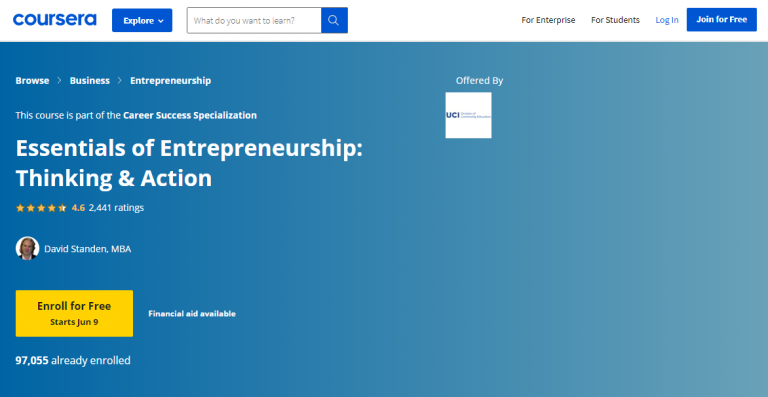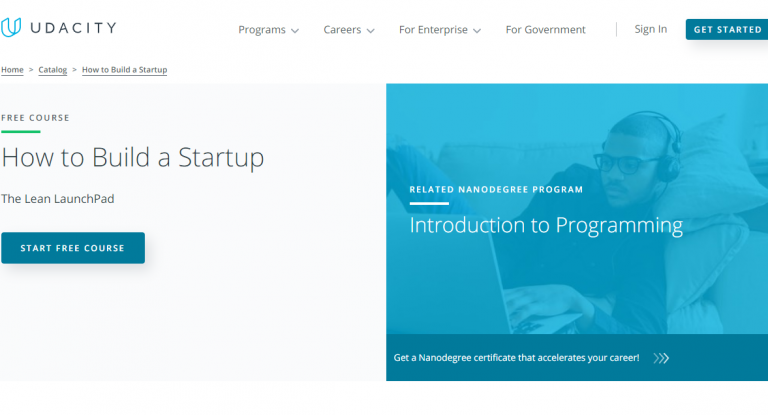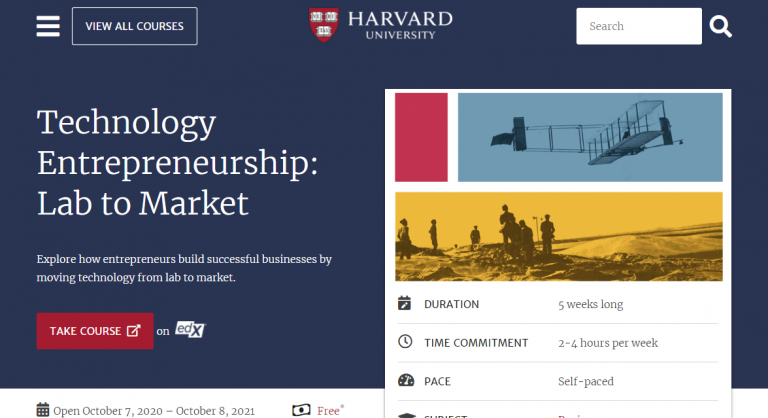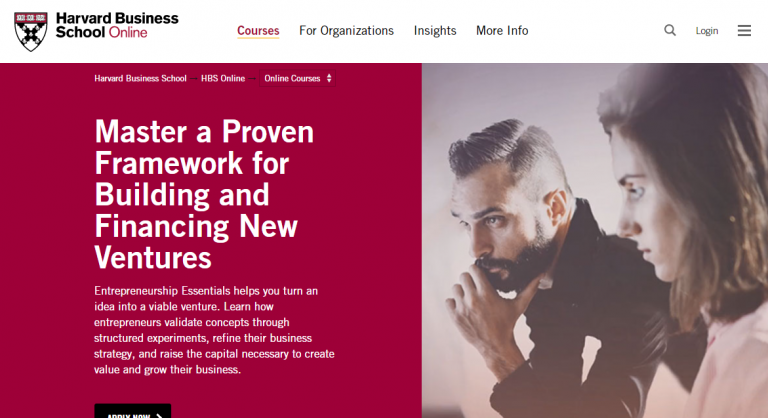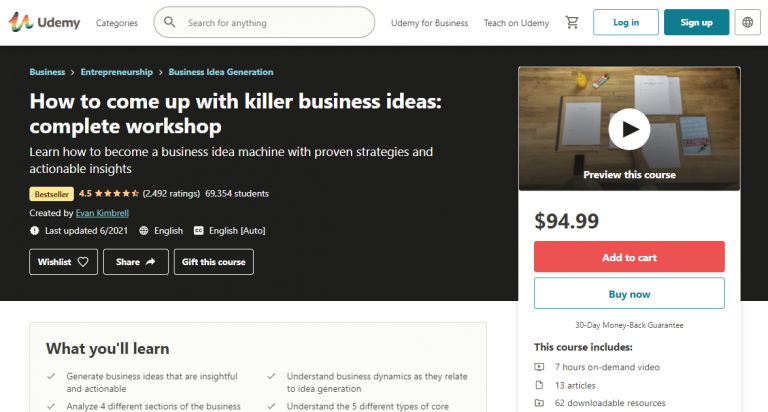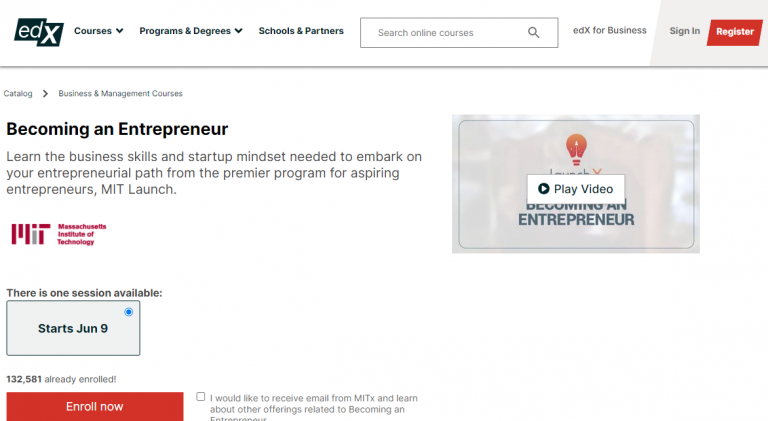Best Entrepreneurship Courses
All topics are curated by you, the community. Free from editorial bias, 100% independent. Upvote your favorite items, propose missing ones and shape the ranking of this topic.
There are a lot of reasons why you might want to become an entrepreneur. Maybe you want to be your own boss, or you have a great business idea that you are passionate about. Whatever your reasons, if you want to be a successful entrepreneur, you need to be prepared.
The best way to prepare for a career in entrepreneurship is to get a good education. There are a lot of great courses out there that can teach you the skills you need to be a successful entrepreneur. Here are some of the best courses for entrepreneurship.
-
Turn Your Idea into a Funded Business. Develop, launch, fund and grow your own business. Offered By University of Pennsylvania
About this Specialization:
Wharton's Entrepreneurship Specialization covers the conception, design, organization, and management of new enterprises. This five-course series is designed to take you from opportunity identification through launch, growth, financing and profitability. With guidance from Wharton's top professors, along with insights from current Wharton start-up founders and financiers, you'll develop an entrepreneurial mindset and hone the skills you need to develop a new enterprise with potential for growth and funding, or to identify and pursue opportunities for growth within an existing organization.
Article from: https://www.coursera.org/specializations/wharton-entrepreneurship#enroll
-
Innovate in a Connected World. Learn about frameworks to manage and innovate in uncertainty. Offered By University of Illinois at Urbana-Champaign
About this Specialization:
In a world characterized by
volatility, uncertainty, complexity, and ambiguity, leaders require robust
innovation skills. Thinking flexibly and developing an entrepreneurial mindset
are critical to thriving in uncertain business environments. This specialization
addresses how to recognize and question assumptions and constraints to identify
and capitalize on opportunities. Learning to change the rules of the game by
creating innovative value propositions and discovering new market positions for
sustained competitive advantage are some of the actionable lessons in this
specialization.
This
specialization will be of value to both aspiring and practicing entrepreneurs
as well as employees in established firms who are interested in becoming
innovative leaders in an interconnected world.
This
specialization is part of Gies College of Business’ suite of online programs,
including the iMBA and iMSM.
Article from: https://www.coursera.org/specializations/innovation-creativity-entrepreneurship
-
Offered By University of California, Irvine
WHAT YOU WILL LEARN:
- Describe the entrepreneurial process and how to manage it
- Recognize opportunities to develop new business ideas
- Apply entrepreneurial approaches, concepts, and methods
- Understand operational challenges involved with creating new business ventures
About this Course
Success in business can be greatly enhanced with an understanding of key entrepreneurial characteristics and competencies solutions. This interactive course provides potential entrepreneurs with the knowledge of succeeding in an entrepreneurial opportunity. Topics include: how creativity, opportunity and feasibility are best evaluated; business strategies for new businesses; importance of a business plan; achieving success in a new business. At the end of the course students will have the skills and confidence to evaluate starting a business, in addition to becoming more enterprising in how they approach their roles should they decide to work in organizations.
Upon completing this course, you will be able to:
- Learn about the many faces of and contexts for entrepreneurship
- Learn about the entrepreneurial process and how to manage it
- Learn about what it takes to be an entrepreneur and your own potential to be one
- Learn to recognize opportunities to generate and assess your own business idea
- Explain the business planning process
- Apply entrepreneurial approaches, concepts and methods to your own business idea
- Learn about the operational issues in developing new business ventures
Article from: https://www.coursera.org/learn/entrepreneurial-thinking
-
The Lean LaunchPad
About this Course
In an introduction to the basics of the famous Customer Development Process, Steve Blank provides insight into the key steps needed to build a successful startup.
The main idea in this course is learning how to rapidly develop and test ideas by gathering massive amounts of customer and marketplace feedback. Many startups fail by not validating their ideas early on with real-life customers. In order to mitigate that, students will learn how to get out of the building and search for the real pain points and unmet needs of customers. Only with these can the entrepreneur find a proper solution and establish a suitable business model.
Building a startup is not simply building an execution plan for a business model that the entrepreneur thinks will work, but rather, a search for the actual business model itself.
Article from: https://www.udacity.com/course/how-to-build-a-startup--ep245
-
Harvard University
What you'll learn:
A systematic approach to technology entrepreneurship
How to generate new use scenarios by matching customer needs with promising technology seeds
How to align business and operating models
How to evaluate a technology for readiness and market fit
How to position opportunities to secure funding
Course description
Universities, government labs, and private companies invest billions of dollars in the research and development of breakthrough technologies that have the potential to transform industries and lives — but very few of these technologies ever leave the lab. Those that do often fail to find compelling market applications. So what determines success? How does an invention become an enduring innovation?
In this introductory course, developed in collaboration with the Laboratory for Innovation Science at Harvard and the University of California San Diego, you’ll explore how entrepreneurs match promising technology with customer needs to launch successful new businesses. Using real-world examples, you’ll apply critical thinking to commercialize technologies, and you’ll learn about the venture creation process from founders, funders, and industry experts.
Join us to learn a systematic process for technology commercialization to bring cutting-edge innovations out of the lab and into the world.
Article from: https://www.edx.org/course/technology-entrepreneurship-lab-to-market
-
Entrepreneurship Essentials helps you turn an idea into a viable venture. Learn how entrepreneurs validate concepts through structured experiments, refine their business strategy, and raise the capital necessary to create value and grow their business.
WHAT YOU'LL LEARN:
Identify a business opportunity
Evaluate an idea and assess the market
Explore the risks and rewards of entrepreneurship
Leverage experiments to validate concepts and refine your business strategy
Discover the key financial decisions entrepreneurs must make in the early stages of a startup
Understand the process of raising capital and how to speak to investors
Article from: https://online.hbs.edu/courses/entrepreneurship-essentials/
-
Learn how to become a business idea machine with proven strategies and actionable insights
What you'll learn:
- Generate business ideas that are insightful and actionable
- Understand business dynamics as they relate to idea generation
- Analyze 4 different sections of the business value chain for potential opportunities
- Understand the 5 different types of core innovation and how to apply them
- How to objectively assess their skills, passions, hobbies, & interests
- Understand the difference between business types and which one to aim for
- Use common techniques like problem identification to come up with ideas
- Use advanced techniques like disintermediation, local modifiers, market enablers to craft ideas
- Understand how to apply new, disruptive business models like Saas, Sharing economy, & PWYW
- Create business ideas that are not only specific but are complete
- Quickly evaluate and re-prioritize ideas based off 5 dimensions
- Understand the value of their ideas and what to focus on first
- Bring context into their environment and not get discouraged
Requirements:
- Familiarity with basic business concepts is useful, but not necessary
Description:
What do Facebook, Groupon, Twitter, Pinterest, & Instagram have in common - besides being ultra successful businesses?
You probably won’t guess it.
Every single company started with an idea that was TERRIBLE.
Yes, that’s right. Mark Zuckerberg, Jack Dorsey, Andrew Mason, Kevin Systrom all started their businesses not with immediate success, but with immediate failure, ridicule, and frustration.
That’s not the story you heard, right?
You probably heard that they all channeled their unlimited brilliance into crafting the perfect idea. An idea so great, so perfect that it was just a matter of time before their idea took the world by storm.
That’s what most people think. And most people are 100% wrong.
- Facebook started as a way to compare attractiveness between classmates.
- Pinterest started as an app that let you get notified when your favorite designer goods went on sale.
- Groupon started as a website for raising funds for charity.
- Instagram started as Burbn, the 400th app to let you “check in” at your favorite businesses.
And yes, Twitter started as a website to list and find podcasts.
None of these ideas were brilliant. They weren’t clever. They certainly weren’t insightful. And they certainly weren't "ahead of their time"
But they WERE created by people who supposedly are.
Business ideas are not an art. They're not things that are limited only to those with experience & creative insight.
Anyone can come up with, develop, and improve business ideas. Business ideas that can be life changing - and I guarantee a whole lot better than the first idea of most major companies.
Stop being intimidated by the process of coming up with business ideas. Learn it, master it, and conquer it.
Learn the science behind creating great business ideas.
Why you should enroll:
- Over 1,000 students have signed up within the first 12 hours of the course going live!
- Course includes over 6 hours of high quality content, including activities, worksheets, quizzes, exclusive discounts, and access to an exclusive class only web idea generating web application
- You'll learn skills that are invaluable in any situation, like being able to assess an ideas marketability, how to spot market inefficiencies, and how to successfully employ brand new, disruptive business models
- You'll have direct access to the instructor, who has vet over 1,000 ideas as a venture capitalists, and hundreds more as a founder and director of a digital agency
About the instructor:
Top rated Udemy Instructor with over 30,000 five star reviews.
Teaches 11 different courses on Entrepreneurship, with over 500,000 students enrolled.
All courses by the instructor have are rated an average of 4.97 out of 5 stars.
+ Worked as a VC and was in charge of deal flow in Silicon Valley. Oversaw investments in large companies like Facebook, LinkedIn, & Tesla.
+ Startup founder for 5 years, raised 3 rounds of capital worth several millions of dollars.
+ Currently Director of a Digital Agency that specializes in taking ideas from raw concept all the way to launch.
Who this course is for:
- Anyone interested in becoming an Entrepreneur
- Anyone who wants to become better at creating business ideas
- Veteran entrepreneurs who want to master the skill of idea generation
Article from: https://www.udemy.com/course/idea-generation-coming-up-with-killer-business-deas/
-
Learn the business skills and startup mindset needed to embark on your entrepreneurial path from the premier program for aspiring entrepreneurs, MIT Launch.
About this course:
Curious about entrepreneurship, but not sure where to start? Becoming an Entrepreneur is designed in partnership with MIT to guide people of all ages and backgrounds through the process of founding a company. With enrollment in the hundreds of thousands, this course is as engaging and accessible as it is informative.
Becoming an Entrepreneur will provide you with inspiration to explore an entrepreneurial path and tools to overcome the initial challenges of building a business.
From developing new business ideas and doing market research to designing and testing your offering and pitching, this course follows LaunchX’s successful approach to entrepreneurship that leverages MIT’s Disciplined Entrepreneurship, lean methodologies, and design thinking. There will be a combination of short videos and activities that will challenge you to get you away from your computer screen and into the community to make a real impact.
No previous business or entrepreneurship experience needed. Join us to embark on your entrepreneurial journey.
What you'll learn:
- Overcoming the top myths of entrepreneurship
- Defining your goals as an entrepreneur and startup
- Identifying business opportunities
- Performing market research and choosing your target customer
- Designing and testing your offering
- Planning your business logistics, plus pitching and selling to customers
Article from: https://www.edx.org/course/becoming-an-entrepreneur
-
Optimize your business for successby learning the fundamentals of entrepreneurial operations.
About this course:
This startup operations course will examine the real-world operational challenges and execution risks associated with getting a new venture started. We will consider start-up ventures in a variety of industries. The course will provide you with a set of steps, frameworks, and tools that can be used to understand the important considerations for building a startup operation from scratch.
In each module, the students will be exposed to a different operations-related concept. Lecture notes, readings, and case studies will explore the key operations topics that are important for start-ups. Topics include:
- The role of Operations in Launching a New Venture
- Developing an Operations Mindset
- Using the Value Chain Canvas to document your Startup Operations
- Operational Risks and Challenges in Launching a New Venture
- Operations Metrics for Managing New Venture Performance
What you'll learn:
- The role of operations in launching a start-up
- The potential operational risks associated with launching a start-up
- How to successfully launcha startup
Article from: https://www.edx.org/course/entrepreneurial-operations-launching-a-startup
-
Pitch your ideas to blue-chip Silicon Valley venture capital firms. Seed funding of $10,000 for the winner of the pitch competition!
Why Enroll in Wharton’s Entrepreneurship Acceleration Program?
There’s no shortage of pitfalls for startups and their founders. The 90 percent failure rate of startups is enough to make you think about keeping your day job — forever. But what if there was a proven playbook that dramatically increased the odds of success?
Being successful in venture capital means having a mix of cross-disciplinary skills, which is why expert faculty for this program stem from social psychology, organizational behavior, information technology, finance, and marketing.
The Formula to Accelerate Your Business
Enroll in this program and dramatically increase the odds of success by learning how to:
- Pick the right business model
- There are many different types of business models. Survey the range of options, including the disruptive model, the architecture model, the value chain model, and the efficiency model, with examples of each type. Utilize the Business Model Canvas tool to help you decide on your model.
- Build the right team
- Learn about the Three Rs of founding teams — relationships, roles, and rewards — and the three critical questions entrepreneurs must address when setting up their company. Topics include allocating equity, founder’s agreements, hiring key management, and finding technical resources.
- Choose the right financing approach
- Raising funds to scale is one of the biggest challenges that startups face. Learn about the various financing pathways available and the tradeoffs for each type. Topics include equity financing valuations, equity financing terms, and term sheets.
- Ramp up sales and scale the business
- In order to drive sales, you need a foundational understanding of your potential customers and markets. Considerations such as the rate of adoption of new products help with demand forecasting. Understand the importance of creating a growth culture and different expansion strategies, such as vertical and horizontal expansion.
Program Topics
Module 1: Evidence-Based Entrepreneurship
Learn how to apply the "lean approach": transform a good idea into a successful business venture while minimizing risk
Module 2: Building the Right Team
Learn how to select founding members, employees, managers, and other key players on your team
Module 3: Lawyers, Advisors, and Mentors
Learn how to use innovation and networking to drive your enterprise forward
Module 4: Business Models and Customer Lifetime Value
Learn how to choose the right business model for your venture
Module 5: Customer Acquisition and Demand Generation
Learn how to find markets and create demand for your product
Module 6: Pricing and Distribution Strategies
Learn how to apply cost structures and pricing mechanisms to your business and use performance measurement tools effectively
Module 7: Gearing Up for Scale
Learn to recruit people who will build your company’s culture and use it to scale up your venture
Module 8: Financing: Funding and Valuation
Learn the various sources of financing available for your business
Module 9: Financing: Venture Capital vs. Alternative Funding Channels
Learn how to make a wise decision about venture capital or alternative funding and how to estimate a breakeven point
Module 10: Elements of the Pitch
Create executive summaries and pitch decks for your business and understand how the exit of founding shareholders affects liquidity
Module 11: Business Plan Competition
Participate in a business plan competition with your peers and create a pitch for your own venture. The winner of the competition and the runner-up will win a substantial cash prize to use for seed funding (rules and restrictions apply).
Business Plan Competition
Participate in a business plan competition with your peers in which you will create a pitch for your own venture. The winner of the competition and the runner-up will win a substantial cash prize to use for seed funding (rules and restrictions apply).
The judging criteria are focused on the customer value proposition, which includes size of market, competitive landscape, and clear differentiation; economic model of the venture; go-to-market plan; and the capabilities and background of the team.
Members of the Wharton entrepreneurship community, with support from program leaders, will review the plans submitted for consideration and will select the top seven business plans as semi-finalists.
Article from: https://online-execed.wharton.upenn.edu/entrepreneurship


